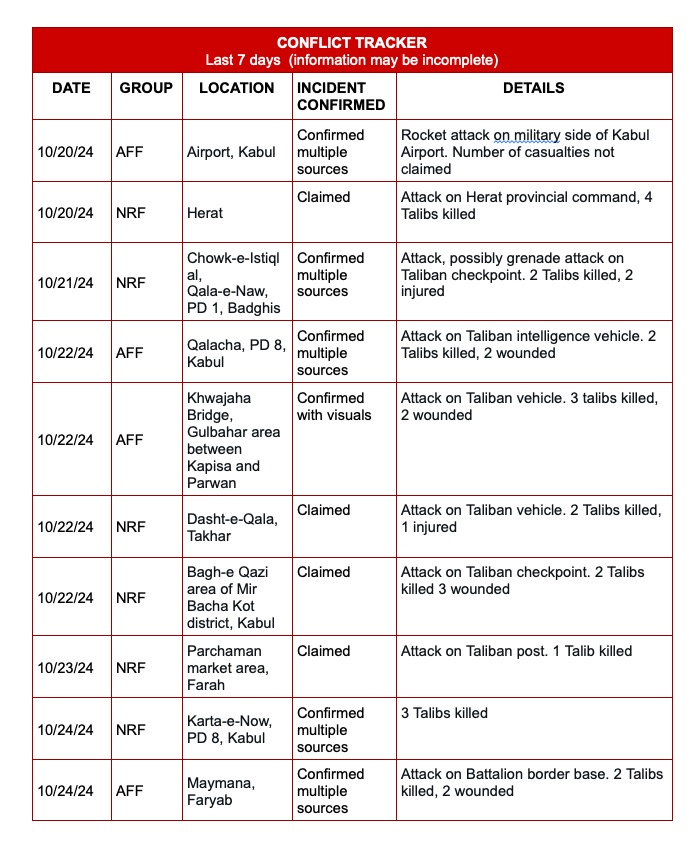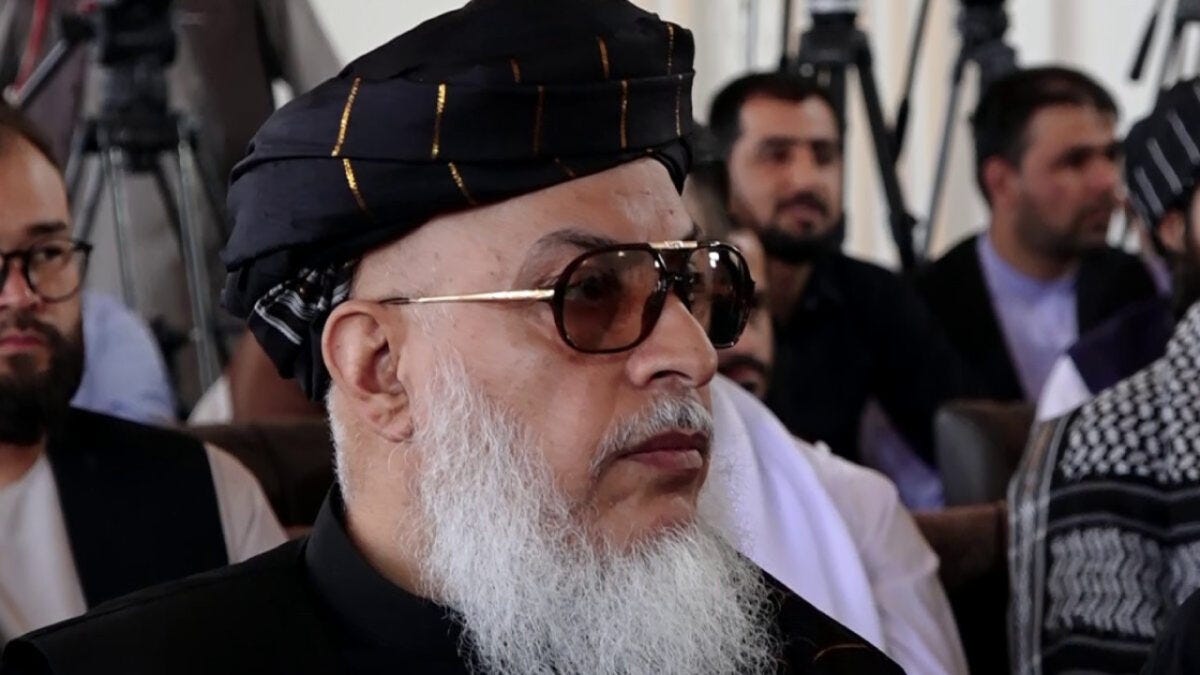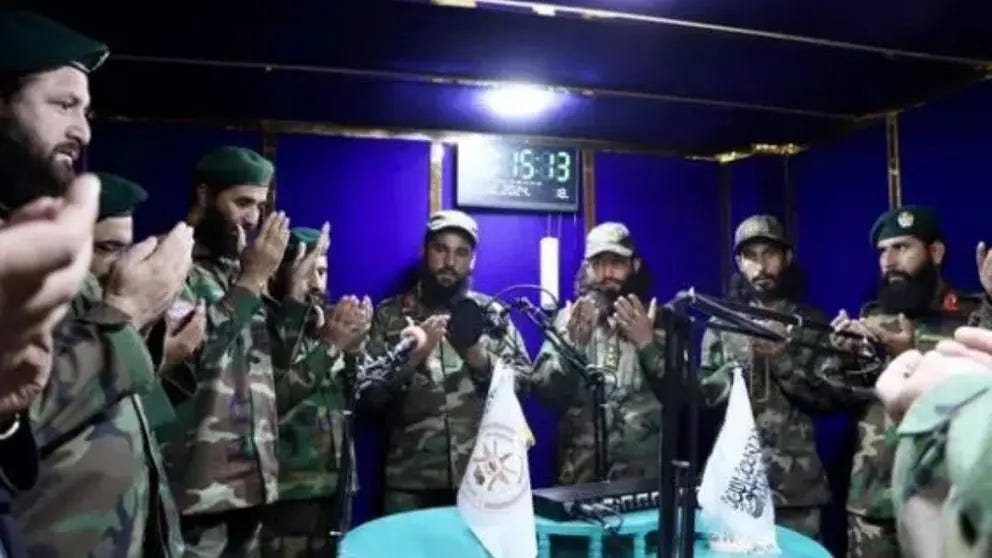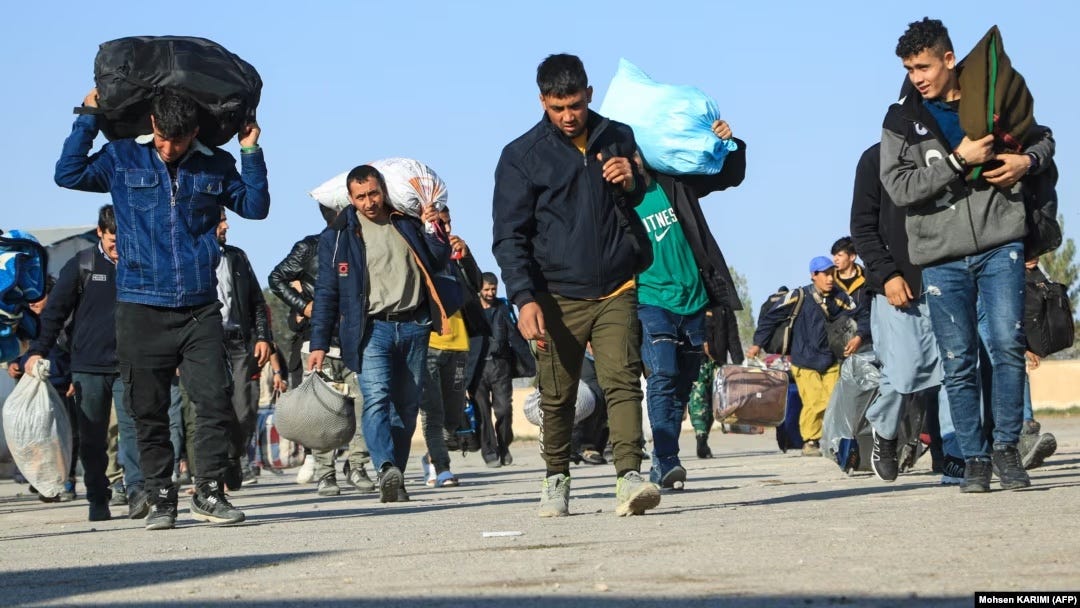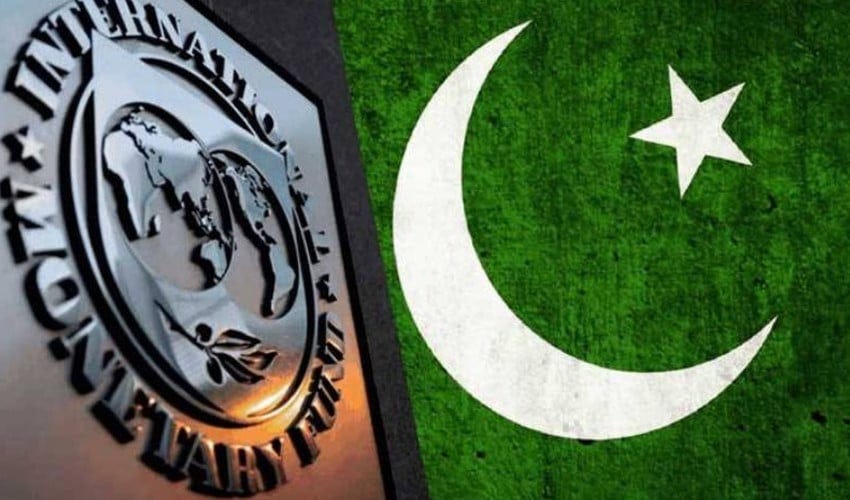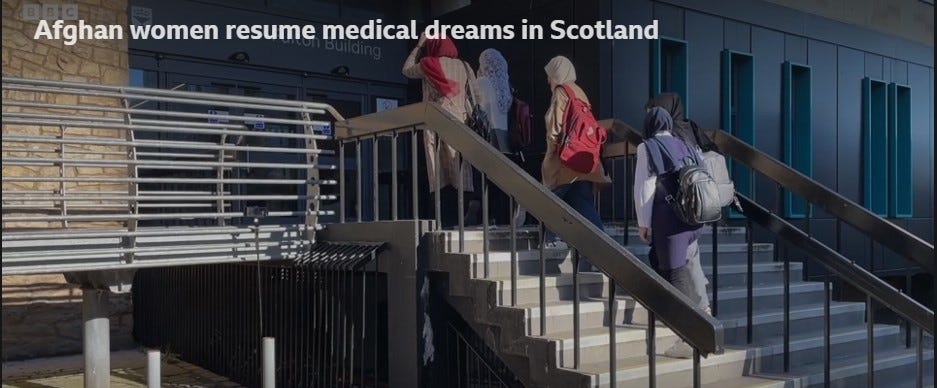Security and Conflict
House to House Searches Kabul – Beginning on Monday, various sources confirmed that the Taliban conducted house-to-house searches in Kabul's PD 4, PD 11, and PD 17. The Taliban stated that they were looking for ISKP members, criminals, and narcotics. Locals reported that the Taliban prevented any filming during the searches. The areas selected suggest the searches may be targeting individuals suspected of sympathizing with resistance fighters.
House to House Searches in Nimroz – This week, the Taliban began conducting house-to-house searches in several provinces, including Nimroz, which has sparked strong reactions from residents. In Khang district, protests erupted after Taliban forces entered a home occupied solely by women and children, leading to the detention of at least 50 protesters, some of whom were reportedly beaten. The Taliban claimed these searches aimed to target drug dealers.
Taliban Fire on Protestors in Ghor – On Saturday, in Feroz Koh, Ghor province, at least six people were injured when Taliban forces opened fire on protesters who were opposing body searches conducted on local women. Demonstrators had gathered to demand an end to these invasive searches, highlighting mounting public anger over the Taliban’s treatment of women. Witnesses described a tense atmosphere as the Taliban used firearms to disperse the crowd, underscoring the growing unrest with their restrictive policies and prompting similar protests across Afghanistan.
IS Attack in Ghor – On October 20, Taliban forces clashed with ISIS fighters in the Nurkoh area of Ghor province. The fighting, which lasted several hours, involved both light and heavy weaponry. The Taliban later claimed they attacked an ISIS hideout, killing two members, although they did not disclose any of their own casualties. Photos circulated online of Engineer Saifullah, a Taliban fighter killed in the clash. Taliban officials allege that ISIS in Ghor operates from Balochistan, Pakistan, where it recruits and trains fighters. ISIS activity has increased in central and western Afghanistan, complicating Taliban efforts to maintain security and targeting civilians in areas beyond Taliban control.
Explosion in Pamir Cinema Market – On Wednesday, an explosion occurred around 2:00 p.m. local time in the Pamir Cinema area of Kabul, targeting the crowded Lailami Market, known for selling second-hand clothes. The blast killed one child and injured 11 people, including a three-year-old girl, a four-year-old boy, a sixteen-year-old boy, two women, and six men, one of whom is in critical condition. The attack struck one of Kabul's most densely populated and impoverished neighborhoods. No group has claimed responsibility for the incident.
Human Rights and Civil Liberties
Further Bans on Women's Voices – Taliban minister Khalid Hanafi recently declared it forbidden for adult women in Afghanistan to let their voices be heard by other adult women, specifically prohibiting them from reciting the Quran or performing the Takbir aloud. This new directive, which is part of broader restrictions on women’s rights, mandates full-body covering, including the face. Hanafi’s comments have sparked significant backlash from Afghan women, who are advocating for their rights against what many see as increasingly oppressive Taliban policies. It remains unclear how this extreme directive will be enforced or if it is an official policy.
Political Analyst Detained – On October 19, Jawed Momand, a university professor and political analyst, was detained by Taliban intelligence agents in Kabul's Karte Naw district. The Taliban have not provided any statement regarding his detention.
Women Prevented from Riding Buses Without Masks – The Taliban’s vice and virtue police in Kabul have barred women and girls from boarding city buses if they are not wearing masks, according to multiple local sources.
Retirees Protest unpaid Pensions – On Saturday, retirees in Kabul protested three years of unpaid pensions, blocking the street leading to the Ministry of Finance. The Taliban dissolved the pension system and cut retiree salaries, exacerbating economic hardships for many. During the protest, one retiree was arrested, underscoring the widespread discontent amid ongoing financial struggles.
Floggings – On Monday, a man and a woman were flogged in Logar province, with similar punishments meted out in Bamiyan the same day. On Wednesday, 17 people were flogged in Khost, followed by the flogging of one man in Kabul on Thursday and one individual in Faryab on Sunday.
Internal Politics
Acting Minister Of Education Statement on Jihadi Madrassas – The Taliban's acting minister for higher education, Neda Mohammad Nadim, emphasized the role of jihadi madrasas in maintaining the jihadist mindset in Afghanistan. In the past 40 days, 16 new madrasas have been established across 10 provinces at a cost of 54 million Afghanis. Afghanistan now has 21,000 madrasas, surpassing the 18,000 schools in the country. Critics, including Afghan citizens and international observers, express concerns that this increase could promote extremism and radicalization, further destabilizing the nation.
Dissent on Banning Living Images – TTaliban officials in Kabul, including Acting Interior Minister Sirajuddin Haqqani, Acting Defense Minister Yaqoob Mujahid, and three Acting Deputy Prime Ministers, oppose Mullah Hibatullah’s ban on broadcasting images of living beings. They argue that the law undermines the Taliban's interests, particularly in media and diplomacy. The Haqqani network, which manages propaganda centers, also criticizes the restrictions. Despite Mullah Hibatullah’s orders, enforcement has been inconsistent, with some officials permitting audio recordings and defying full implementation.
Saleh Statement on Doha Process – On Friday, former Vice President Amrullah Saleh claimed that the Doha process, backed by NATO, effectively constituted a coup against Afghanistan’s Republic. He argued that it was a carefully orchestrated effort to sideline Ashraf Ghani and destabilize the government. Saleh asserted that many Afghan political leaders supported anti-republicanism, viewing it as a means of securing personal gain, under the assumption that the U.S. would integrate the Taliban into the government. Instead, he contended, this strategy resulted in national disgrace and authoritarian rule.
International Developments
NYT Publishes Interview with Haqqani – On Thursday, the New York Times published an interview with Sirajuddin Haqqani, the Taliban's acting interior minister and a wanted terrorist. In the interview, Haqqani portrays himself as a dissident within the Taliban and attempts to present himself as a diplomat. He has a $10 million bounty on his head from the U.S. for orchestrating terrorist attacks against international forces, Afghan officials, and civilians.
CSTO Approves Plan to Strengthen Afghan-Tajik Border – On Saturday, Imangali Tasmagambetov, secretary general of the Collective Security Treaty Organization (CSTO), announced plans to enhance Tajikistan's border security with Afghanistan at an upcoming CSTO meeting in Astana. The draft plan has been reviewed and agreed upon by CSTO member states. The organization has expressed ongoing concerns about the potential spread of extremism from Afghanistan to Central Asia over the past three years. Representatives from over 40 countries recently warned that rising extremism and radical teachings could lead to catastrophic consequences.
OCHA report on Projects in Afghanistan – The UN Office for the Coordination of Humanitarian Affairs (OCHA) reported that in September 2024, 83 humanitarian projects were temporarily suspended due to 173 incidents, 98% of which were attributed to Taliban interference. This marks a 66% increase from last year. The incidents involved disruptions to operations, violence against staff, and movement restrictions. The Taliban also imposed illegal taxes, seized aid, delayed document processing, and enforced strict regulations on female staff, threatening the safety of humanitarian workers.
Afghan Consulate in Germany to Close – On Thursday, Germany requested that Afghanistan’s ambassador in Berlin and its consul in Bonn step down, refusing to accept Taliban-appointed representatives. However, technical staff will continue to provide consular services at the embassy and consulate, according to a diplomatic source. The German government maintains its position against recognizing Taliban officials.
BRICS Statement on Afghanistan – At the Kazan summit on Thursday, BRICS leaders, including those from China and Russia, urged the Taliban to lift the ban on girls' and women's education. They emphasized the need to respect the fundamental rights of Afghan citizens, including women and ethnic groups, and called for immediate humanitarian aid. The leaders also stressed the importance of taking action against terrorism in Afghanistan and highlighted the role of regional platforms in addressing the country’s challenges. BRICS reaffirmed its support for a peaceful, independent Afghanistan.
Afghan Representative Speaks at UN – On Wednesday, Nasir Ahmad Faiq, Afghanistan's acting representative to the UN, urged the international community to take decisive action regarding Afghanistan’s crisis. Speaking to the UN General Assembly’s Third Committee, he emphasized the Taliban’s oppressive policies, particularly gender apartheid, and called for its criminalization under international law. Faiq highlighted the Taliban’s focus on extremism in education and the erosion of fundamental rights, especially for women and girls.
Freedom of the Press
Ban on Living Images and TV Station Shutdowns – Television stations in Badghis province have ceased operations following a Taliban directive banning live images, according to the Afghanistan Journalists Center (AFJC). Both state-run and private TV stations are now limited to written and audio content. The ban, enforced under the "Promotion of Virtue and Prevention of Vice" law, extends to other provinces, posing a significant threat to press freedom. On Thursday, sources reported that the Taliban have expanded the ban on broadcasting images of living beings to at least 10 provinces, including Kandahar, Helmand, Uruzgan, Kunar, Khost, Takhar, Badghis, Panjshir, and Laghman.
400 Books Banned in Kabul – The Taliban have banned 400 books in libraries across Kabul, mandating their removal if they conflict with Taliban principles, according to local librarians. The ban targets works related to Shia Islam, democracy, political freedoms, civil rights, art, and prominent figures such as Ahmad Shah Massoud. Librarians report that the Taliban have already begun collecting these titles and promoting works deemed acceptable by the regime. Booksellers fear financial losses and potential crackdowns as enforcement is expected to intensify starting in November.
Regional Developments
China to Exempt Afghan Goods from Tariffs – On Friday, The Taliban government announced that China will exempt Afghan exports from taxes starting in December, as confirmed in a recent meeting between Chinese Ambassador Zhao Xing and Taliban Deputy Prime Minister Mawlawi Abdul Kabir. Ambassador Zhao expressed hopes of increasing Afghan exports to China from 11.5% to 25% next year. China plans to open an economic corridor via Tajikistan and activate the Wakhan Corridor, while the Taliban praised the tax exemption and urged similar support from neighboring countries.
Pakistan Has Not Appointed New Special Envoy – Pakistan’s decision not to appoint a new special envoy for Afghanistan, following Asif Durrani’s resignation on September 14, is seen by sources as a sign of reduced engagement with the Taliban. Six weeks have passed without a replacement, signaling a possible shift in Pakistan’s approach to Afghan relations.
Uzbek Grand Mufti Arrives in Afghanistan – On Thursday, the Taliban announced that Nuruddin Khalq Nazar, the Grand Mufti of Uzbekistan, visited Kabul with a high-ranking religious delegation to strengthen relations between Uzbekistan and Afghanistan. During a meeting with Taliban Deputy Administrative Head Abdul Salam Hanefi, both sides discussed expanding cooperation based on shared religious, historical, and cultural ties, despite the Taliban's ongoing strict enforcement of Sharia law in Afghanistan.
Doha Representative speaks with UN on Afghanistan – On Wednesday, Qatar's Special Envoy Faisal bin Abdullah Al Hanzab met with Arafat Jamal, UNHCR representative in Afghanistan, to discuss the humanitarian situation and cooperation efforts. They reviewed Afghanistan's latest developments and peace promotion. The meeting aligns with Qatar's commitment to the Doha Process, addressing Afghanistan's ongoing humanitarian and political challenges.
Miscellaneous
Report on Malnutrition – The International Federation of Red Cross and Red Crescent Societies (IFRC) has raised concerns over increasing acute malnutrition in Afghanistan, driven by economic instability, climate disasters, and decades of conflict. From May to September 2024, malnutrition rates surged among children and pregnant women, with 3.2 million children under five and 840,000 pregnant/lactating women affected. Severely impacted provinces include Kandahar and Paktika. This crisis worsens as international aid declines, exacerbating hunger and health issues.
Report on Afghan Migration – Between July and September 2024, 786,769 Afghan citizens left Afghanistan while 973,696 returned, according to the IOM. The report, Mobility Dynamics at Afghanistan’s Borders, highlights migration driven by economic opportunities, healthcare access, family visits, and safety concerns. Nearly six million Afghans now reside in Iran and Pakistan, with 3.75 million in Iran and 2.05 million in Pakistan, making Afghans the world’s largest refugee population, surpassing Syrians. The full report can be accessed here
Lack of Electricity at Mes Aynak – Afghanistan’s Aynak copper mine faces setbacks due to unreliable electricity, according to the Chinese company Metallurgical Corporation of China (MCC). During a recent meeting, MCC emphasized that insufficient power could hinder progress on the project, despite a $2.5 billion investment agreement. Persistent delays, mainly due to security concerns, have stalled significant work on the mine, which holds one of the world’s largest untapped copper reserves.
NEXT WEEK
Taliban checkpoints and house-to-house searches are likely to continue, particularly in areas with large minority populations.
Fighting along the Afghanistan-Pakistan border, especially in Khyber Pakhtunkhwa, is also expected to persist. Imran Khan’s appeal hearing is scheduled for Tuesday; protests and tightened security are likely, especially in Islamabad, and disruptions to social media or phone access may occur. Afghans in Pakistan are advised to avoid unnecessary travel, crowds, and protests during this time.
Tensions remain high in Iran, where Afghans are advised to stay alert to potential clashes or attacks involving Iran and Israel. Meanwhile, targeted deportations of Afghans continue, regardless of their immigration status.
REGIONAL ROUNDUP
IRAN
Israel Attacks Iran – On Saturday morning, Israel launched pre-dawn airstrikes on Iranian military sites connected to ballistic missile production, in retaliation for missile attacks on Israel earlier in October. Iranian officials reported limited damage, but the strikes represent a significant escalation in the long-standing conflict. Iran’s military confirmed casualties and vowed to respond to foreign aggression. The situation raises concerns of broader regional conflict, given Iran’s support of militant groups like Hamas and Hezbollah. International responses call for restraint to prevent further escalation in the already tense Middle East.
Afghan Migrants Face Continued Deportation and Abuse Iran – Tehran’s governor, Mohammad Sadegh Motamedian, reported that two to three million Afghan immigrants now live in the city, with numbers rising sharply since Afghanistan’s government fell. Recently deported Afghans report mistreatment by Iranian police, including beatings and arrests at work, often resulting in families being left behind. Despite holding legal documents, many face forced deportation under harsh conditions, highlighting the difficult situation for Afghan migrants. Iran’s Deputy Governor of Lorestan, Moslem Moradi, announced a strict ban on Afghan migrant employment in various sectors of Borujerd County, warning that violators will face legal action. Unauthorized activities by foreign nationals, including property transactions, are also criminalized, with swift deportation measures in place for those overstaying. On Sunday, the Public Prosecutor of Taybad, Iran, announced a ban on transporting undocumented Afghan nationals in private vehicles, with penalties and vehicle impoundment for violators.
Border Guards Killed – Ten Iranian border guards were killed in an attack in the Koh-e-Rakuh area of Taftan, Sistan-Baluchestan province, prompting an investigation by police commanders and the Interior Ministry. The attack was claimed on Sunday by Jaish al-Adl, and public mourning will be held in the province.
Two Afghans Executed – On Thursday, human rights group Hengaw reported Iran’s execution of two Afghans, Ayoub Sangar and Abdul Raqib Maliki, in Qom Central Prison after four years in prison for murder. Nearly 1,250 Afghans remain detained in Iranian prisons, raising ongoing legal and human rights concerns.
PAKISTAN
Clashes in Khyber Pakhtunkhwa - Pakistani security forces killed TTP’s shadow deputy governor Ustad Quraishi and eight others in an operation in Bajaur on Wednesday night, triggering TTP retaliation in Dera Ismail Khan with four deaths and over 20 injuries. On Thursday, Pakistan’s army reported another clash in Bajaur, resulting in nine more militant deaths. TTP is expected to continue revenge attacks on Pakistani forces.
Clashes in Tirah Valley near Afghan Border – In Khyber district, an attack on a security convoy killed five soldiers, with two attackers killed in retaliation in Tapu Sangar. A separate assault on a police station in Mullagori killed one policeman. The violence in Khyber Pakhtunkhwa has intensified, with ten soldiers confirmed dead in Dera Ismail Khan.
Imran Khan Appeal Date Set – Imran Khan’s appeal against his 14-year sentence in the Toshakhana case is scheduled for October 29 in the Islamabad High Court (IHC), led by Chief Justice Aamir Farooq. The IHC has also ordered a medical evaluation for Khan and permitted access for his legal team after previous restrictions due to security concerns.
Former First Lady Released From Prison – On Thursday, former First Lady Bushra Bibi was released from prison after nearly nine months, following a federal high court’s approval of her bail. She and former Prime Minister Imran Khan, sentenced in January for alleged corruption, face ongoing legal battles amid new charges, which Khan claims are politically driven.
SPOTLIGHT ANALYSIS
How the Taliban Built an Air Force
Gil Barndollar
The collapse of the Afghan state amid the United States’ withdrawal in 2021 gifted the new Taliban government with more than $7 billion worth of U.S. military equipment. Afghanistan’s new overlords suddenly found themselves with fleets of Humvees, mountains of machine guns, and forests of radars and satellite dishes. The vast hardware hoard also included dozens of aircraft: a motley mix of Hind and Blackhawk helicopters, cargo planes, and close air support props.
Before the Taliban even had time to inventory their new arsenal, Egyptian filmmaker Ibrahim Nash’at arrived in Kabul. From his home in Berlin, he had seen the scenes of civilians storming Kabul’s international airport in a desperate attempt to flee, and he had managed to obtain permission to come to Afghanistan and film. But his plan—to record the suffering of ordinary Afghans—was swiftly dashed. Accompanied by a Taliban minder at all times and forbidden to film anyone other than a Taliban commander and his men, Nash’at was forced to switch tack. That commander happened to be Mawlawi Mansour, the Taliban fighter in charge of creating a new Taliban air force from the equipment and pilots who were left behind.
Under orders from Mansour, Nash’at became the unexpected chronicler of a high-profile facet of Afghanistan’s regime change. The result is Hollywoodgate, a 90-minute documentary named after the sprawling U.S. base in Kabul, where the Taliban created their new air force after U.S. forces fled. In a total of seven months in the new Afghanistan and assisted only by a lone translator, Nash’at shot 220 hours of footage, later culled down with a team of five producers and nine Afghan translators. Overcoming his subjects’ extreme suspicion, Nash’at managed eventually to blend into Taliban meetings, inspections, and military missions, becoming so invisible that his subjects forgot about his camera and relaxed.
AFGHAN NEWS
'The Taliban Likes Facebook': Why The 'Photo Ban' In Afghanistan Won't Work
Amos Chapple
A photojournalist who worked in Afghanistan during the Taliban's 1996-2001 rule says the reinstated group's new ban on images of living things is unfeasible today.
In the 1990s, the Afghan photojournalist, who asked to remain anonymous due to his continued links to the country, recalls that “photos were completely prohibited. The Taliban banned it. Even if there was a press conference or something, they said, ‘You cannot take pictures.’”
But during the first Taliban era, in which punishments could be severe for even minor transgressions, taking photos of people was still a regular, risky occurrence for the photojournalist, along with a small number of his fellow Afghans working for Western news agencies.
“We had small cameras, and when we went to do stories we would just go somewhere where there was no more Taliban, and we would take one or two shots, then quickly leave," he says. "It was like a 'stolen picture.'"
Senior Taliban official acknowledges internal divisions over political matters
Amu TV
Abbas Stanekzai, the Taliban’s deputy foreign minister, publicly acknowledged internal disagreements among Taliban leaders over political issues, describing these divisions as efforts aimed at “reforming society.”
Speaking at a coordination meeting between the Taliban’s Ministry of Information and Culture, Kabul municipality, and chambers of commerce, Stanekzai admitted to differing perspectives within the Taliban on a wide range of political, economic, and cultural matters, though he downplayed these differences as non-competitive. “Our disagreements are not over power or position,” he said. “Differences exist everywhere, and within the Emirate as well. These differences are meant to strengthen and improve society.”
With Restrictions On Visual Media, Taliban's Ministry of Defence Launches Its Radio
Afghanistan International
With the Taliban's efforts to prevent the broadcast of images of living creatures in the visual media, the group's Ministry of Defence announced the launch of operations of "Sada-e-Khalid" radio.
The Taliban's Ministry of Defence said that the radio station has started broadcasting from the 201st Corps.
REGIONAL NEWS
US Justice Department
The Justice Department announced today the unsealing of a superseding indictment containing murder-for-hire, money-laundering, and sanctions evasion charges against Ruhollah Bazghandi, also known as Roohollah Azimi; Fnu Lnu, also known as Haj Taher, Haj Taher; Hossein Sedighi; and Seyed Mohammad Forouzan, all of Iran.
“The Justice Department has now charged eight individuals, including an Iranian military official, for their efforts to silence and kill a U.S. citizen because of her criticism of the Iranian regime,” said Attorney General Merrick B. Garland. “We will not tolerate efforts by an authoritarian regime like Iran to undermine the fundamental rights guaranteed to every American. Three of the defendants charged in this horrific plot are now in U.S. custody, and we will never stop working to identify, find, and bring to justice all those who endanger the safety of the American people.”
The Azadi Briefing: Calls For Probe Into Reported Killing Of Afghan Migrants On Iran Border
Abubakar Siddique
The United Nations and international rights groups have called for an investigation into reports that Iranian border guards fired on and killed Afghan migrants seeking to cross into Iran from Pakistan.
Local reports and rights groups say the incident occurred on October 13 in the Saravan district of Iran’s southeastern province of Sistan-Baluchistan, an impoverished and volatile region.
Rise in violence against Chinese nationals in Pakistan threatens China's 'Silk Road' vision
Libby Hogan
When China's Premier Li Qiang visited Pakistan last week — the first such visit in over a decade — the talks focused on boosting security for Chinese projects.
China is spending billions of dollars on the China-Pakistan Economic Corridor infrastructure project, which spans 3,000 kilometres and includes the strategic Gwadar Port in Balochistan, in the country's south-west.
PTI Plans Legal Action Against Defectors
Ikram Junaidi
Opposition PTI on Monday decided to take legal action against its lawmakers who had voted in favour of the 26th Constitutional Amendment in clear violation of the party policy.
The controversial amendment was passed by both houses of parliament on Sunday night.
The options being considered by the PTI are to send a reference to the National Assembly Speaker, approach the Election Commission of Pakistan as well as the Supreme Court against these lawmakers, and urge the masses to go for their social boycott.
Shahnaz Rana
Pakistan has failed to meet a major condition of the International Monetary Fund (IMF) to generate Rs342 billion in cash surplus by the four provincial governments due to Punjab's lower-than-estimated cash surplus during the first quarter of this fiscal year. The provincial governments missed the condition by a margin of Rs182 billion or 53%, underscoring serious challenges in the implementation of the $7 billion IMF deal.
Instead of the Rs342 billion target, the provinces cumulatively posted a cash surplus of Rs160 billion, according to interim data compiled by the federal government based on inputs from provincial finance departments. Finance Ministry spokesman Qumar Abbasi was not available for comments.
INTERNATIONAL NEWS RELATING TO AFGHANISTAN
Bennett highlights Afghanistan’s human rights crisis during visit to Canada
Amu TV
Richard Bennett, the United Nations Special Rapporteur on Human Rights in Afghanistan, underscored the severity of the human rights crisis in the country during a meeting with Afghan activists in Toronto. Bennett’s visit to Canada includes discussions with Canadian officials and members of the Afghan diaspora as well as activists and journalists, focusing on the deteriorating situation under Taliban rule.
One event on Wednesday, organized by the Research and Advocacy Network for Women and Children, brought together dozens of Afghan-Canadian activists, including former parliamentarians, university professors, journalists, and civil society leaders. Bennett highlighted the urgency of addressing the escalating human rights violations in Afghanistan, particularly concerning women and ethnic minorities.
Hawaii man accused of lying for money to help Afghans enter the U.S.
Lynn Kawano
Marty Anthony Muller was arrested just after 3:00 a.m. Monday at Honolulu’s Daniel K Inouye International Airport.
He had just arrived on a flight from the Marshall Islands, where he works as a contractor.
Agents with the State Department’s Diplomatic Security Service escorted him to a waiting vehicle before taking him to the Federal Detention Center.
Muller is a United States citizen who worked as a contractor in Afghanistan until 2017 when he moved to Hawaii.
Afghan women describe joy at resuming medical dreams in Scotland
BBC
Medical students banned from attending university in Afghanistan, have described their joy at being able to resume their studies in Scotland. In 2022, the Taliban banned women from attending university after retaking control of Afghanistan.
Lewis-based charity the Linda Norgrove Foundation worked with UK and Scottish governments to arrange visas and places at medical schools. Linda Norgrove was kidnapped by the Taliban in 2010 and died during an attempt by the US military to rescue her.
Her parents John and Lorna set up the charity later that same year.
Afghani to the Dollar: $1 – 66.85 AFN (as of 27 October 2024)


